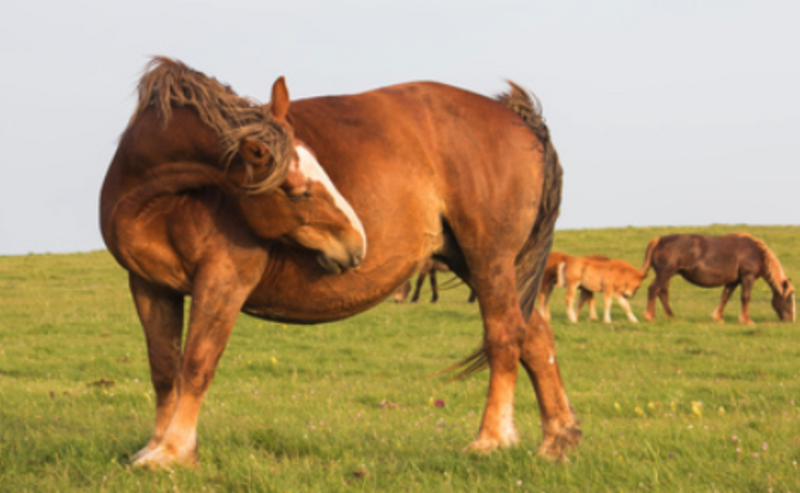Published: February 2020 | Updated: October 2022
What Does Horse Poop Look Like and How Often Do Horses Poop?
Mucking out stalls is part of the daily ritual of being a horse owner. But what does the look and color of your horse's manure mean?
Whether you own a high-performance eventer, a working ranch horse, or a much-loved pet pony, you need to know what the characteristics of your horse’s poop mean. It’s one of the first ways your horse’s body will communicate distress.
Your horse produces around 9 tons of poop every year. That’s one big mound of messages coming straight from his digestive tract.
But what does it all mean? And what should you do if you spot a problem?
Recurring gut problems in your horse can lead to diarrhea, abdominal pain, or colic. It is important to learn how to spot a problem before it gets serious, which is why we talked to our equine veterinarians and FullBucket co-founders, Dr. Keith Latson and Dr. Rob Franklin, for their expert advice.
The Perfect Poop
If you’re the one who mucks out your horse’s field and stall, you have a good idea of what’s normal for him. Get to know how much poop he produces and how often, so that you know when something is off.
A healthy horse poop will take the form of soft, separate balls of feces, pretty uniform in color. There might be visible strands of food but no solid chunks of undigested matter.
It shouldn’t smell too bad (healthy manure smells mild and sweet, at least compared to dog or cat poop!) And it should not have any mucus or blood in or around it.
It’s normal for your horse to go upwards of eight times per day but frequency will depend on the horse’s age and diet.
Stallions and foals tend to poop more often than mares and geldings.
And, yes, horses use their poop as a social marker. Don’t be surprised if he goes more often when a new horse is in the vicinity.
Horse Poop Problems
So you know what’s normal for your horse. What should you do when you notice that his poop is different than usual?
Horses are sensitive animals. Their bodies can respond to small changes that we would dismiss as insignificant.
Start thinking about all the factors that could have an impact: changes in diet or environment, and external stressors.
If It’s Too Wet: Diarrhea
Any horse owner who has watched their beloved horse writhing in pain from colic knows the agony of feeling so helpless.
Horses' guts are incredibly complex. There’s a lot that can go wrong, and things can spiral out of control fast.
Just like for humans, diarrhea can signal complicated digestive issues, including infection. But diarrhea could also stem from something you’ve done - even with the best of intentions.
For example, if you change your horse’s feed program or supplement program too quickly, your horse’s GI system might struggle to adapt.
If It’s Too Dry: Impaction
Horses are prone to impactions, which is often thought of as being constipated.
There are some technical aspects to terminology that deal with motility vs. desiccation of the feces but regardless, horses can become constipated (impacted) in certain circumstances.
Use Your Horse’s Poop As a Measure of Health
Don’t hesitate to call your veterinarian if you notice wet, loose, or runny stools. This is particularly important for older horses, foals, or high-performance horses.
Similarly, if you notice that your horse is showing signs of constipation, it is important to deal with an impaction as soon as possible.
Make sure that you are honest and really dig deep to think back a few days (or weeks) to what has changed in your horse’s world.
Tell your veterinarian if you have recently made any changes to your horse’s feed, grazing, supplements, environment, or training program, as all of these factors and more can impact your horse’s delicate microbiome.
How to Help Protect Your Horse’s Gut
As horse owners, you are always trying to do the best for your loved four-legged friend. And sometimes even our best intentions have negative consequences.
There is nothing to beat yourself up about – change is a normal part of the modern horse’s life!
Unfortunately, their body systems have not yet evolved to adapt quickly to all the changes we impose on them.
The good news is that we created FullBucket’s Equine Probiotic Pellets to help alleviate the stresses of change on your horse’s body, while also offering you peace of mind!
The EQ Probiotics for horses contain the perfect daily dose of highly concentrated pre- and probiotics, specifically designed for your horse’s gut health.
Equip your horse’s gut with veterinary-strength pre- and probiotics today to help ensure healthy horse poop, every single time.

